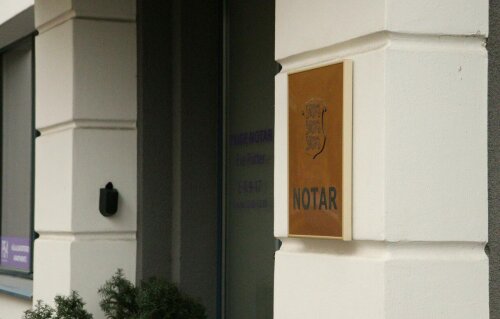Best Conveyancing Lawyers in Paide
Share your needs with us, get contacted by law firms.
Free. Takes 2 min.
Free Guide to Hiring a Real Estate Lawyer
List of the best lawyers in Paide, Estonia
About Conveyancing Law in Paide, Estonia
Conveyancing in Paide, Estonia refers to the legal process of transferring ownership of real estate or property from one person or entity to another. This process ensures that property transactions are carried out lawfully, and that both buyers and sellers meet all legal requirements. Conveyancing in Estonia is governed by the Law of Property Act (Asjaõigusseadus), as well as various local regulations. In Paide, which is a municipality in Järva County, these laws are applied in accordance with national standards, but certain local procedures and requirements may also be involved.
Why You May Need a Lawyer
There are several situations where hiring a lawyer for conveyancing in Paide, Estonia becomes not just advisable but necessary. These include:
- Drafting or reviewing sale and purchase agreements
- Ensuring all documentation is accurate and complete
- Handling complex transactions involving multiple parties or encumbrances
- Assisting with issues related to mortgages, leases, or easements on the property
- Advising on cross-border property transactions
- Managing disputes or clarifying boundaries and property rights
- Representing buyers or sellers during negotiations
- Registering the property transfer with local authorities
- Ensuring compliance with tax obligations
- Guiding foreign investors through unfamiliar legal processes
Local Laws Overview
Estonia’s legal system establishes strict requirements for conveyancing. Here are some key aspects to consider when dealing with property in Paide:
- Written Agreement: All real estate sales agreements must be drawn up in writing and signed before a notary public.
- Notarization: Notarial authentication is mandatory for all real estate transfers. The notary verifies the identities of the parties, reviews the transaction, and enters the agreement into the official system.
- Land Register: Ownership is only legally transferred once the transaction is entered into the Estonian Land Register. This register is publicly accessible and administrated by the courts.
- Due Diligence: Buyers are advised to check for encumbrances, such as mortgages, liens, or rights of use registered on the property.
- Tax Implications: While conveyancing itself usually does not incur a property transfer tax, other taxes and notary fees apply. The seller may also need to pay income tax on profits from property sales.
- Restrictions on Foreigners: In most cases, foreigners can purchase real estate in Estonia, but certain restrictions may apply, especially for agricultural land.
- Local Specifics: In Paide, as in other municipalities, local planning rules and building regulations could affect transactions. Always check for zoning or usage restrictions with Järva County authorities.
Frequently Asked Questions
What is the role of a notary in buying or selling property in Paide?
A notary in Estonia must certify all property sale agreements. The notary reviews the transaction, confirms party identities, enters the deal into the Land Register, and ensures compliance with all legal requirements.
How long does the conveyancing process take in Paide?
Typically, the process takes a few weeks, depending on the complexity of the transaction and the availability of documentation and parties. Registration in the Land Register might take several days to a couple of weeks post-signing.
What documents do I need for a conveyancing transaction?
You will need personal identification, proof of ownership, mutually signed purchase agreement, land register extracts, and, if applicable, loan or mortgage documents.
Can foreigners buy property in Paide, Estonia?
Yes, foreigners are generally allowed to buy property in Estonia, with some restrictions on certain types of land such as agricultural land or properties in protected zones.
Are there taxes associated with purchasing property?
There is no property transfer tax in Estonia, but there are notary fees and state fees for registering the new owner. The seller may be liable for capital gains tax.
What checks should I do before buying a property?
You should verify the property’s registration, ownership, any debts or encumbrances on the property, local zoning and planning conditions, and that all building permits are in order.
What happens if there are debts or mortgages on the property?
All debts, liens, or mortgages registered against the property must be resolved as part of the sale process. The notary makes sure they are cleared or properly transferred during the transaction.
Can I carry out a conveyancing transaction without a lawyer?
While Estonian law does not require a lawyer for conveyancing, it is highly recommended, especially for non-Estonian speakers or complex transactions, to ensure protection of your interests.
How do I access the Land Register?
The Estonian Land Register is public and can be accessed online. Notaries and lawyers can also help you obtain the necessary information.
How can disputes over property boundaries be resolved?
Disputes are typically resolved first through negotiation or mediation. If that fails, courts can make a final determination, often relying on official maps or expert evaluations.
Additional Resources
Here are some useful resources for anyone dealing with conveyancing in Paide, Estonia:
- Estonian Land Register (Kinnistusraamat) - for verifying property records
- Estonian Chamber of Notaries - for finding a notary in Paide
- Estonian Bar Association - for locating a qualified property lawyer
- Järva County Government - for local planning and land use regulations
- Tax and Customs Board - guidance on tax obligations arising from property transactions
- Consumer Protection and Technical Regulatory Authority - for guidance on property and construction consumer rights
Next Steps
If you need legal assistance in conveyancing in Paide, Estonia, consider the following steps:
- Collect all relevant property documents and personal identification
- Consult with a qualified notary or property lawyer to discuss your needs
- Verify property records and clarifications in the Land Register
- Ensure that all contractual documents are reviewed by a legal expert
- Check with local authorities for any planning or zoning restrictions
- Clarify tax implications before finalizing the transaction
- Attend signing meetings with all parties and the notary present
- Register the change of ownership to complete the process
Legal professionals experienced in Estonian conveyancing can guide you smoothly through the process, help avoid costly mistakes, and ensure your transaction is legally secure.
Lawzana helps you find the best lawyers and law firms in Paide through a curated and pre-screened list of qualified legal professionals. Our platform offers rankings and detailed profiles of attorneys and law firms, allowing you to compare based on practice areas, including Conveyancing, experience, and client feedback.
Each profile includes a description of the firm's areas of practice, client reviews, team members and partners, year of establishment, spoken languages, office locations, contact information, social media presence, and any published articles or resources. Most firms on our platform speak English and are experienced in both local and international legal matters.
Get a quote from top-rated law firms in Paide, Estonia — quickly, securely, and without unnecessary hassle.
Disclaimer:
The information provided on this page is for general informational purposes only and does not constitute legal advice. While we strive to ensure the accuracy and relevance of the content, legal information may change over time, and interpretations of the law can vary. You should always consult with a qualified legal professional for advice specific to your situation.
We disclaim all liability for actions taken or not taken based on the content of this page. If you believe any information is incorrect or outdated, please contact us, and we will review and update it where appropriate.









